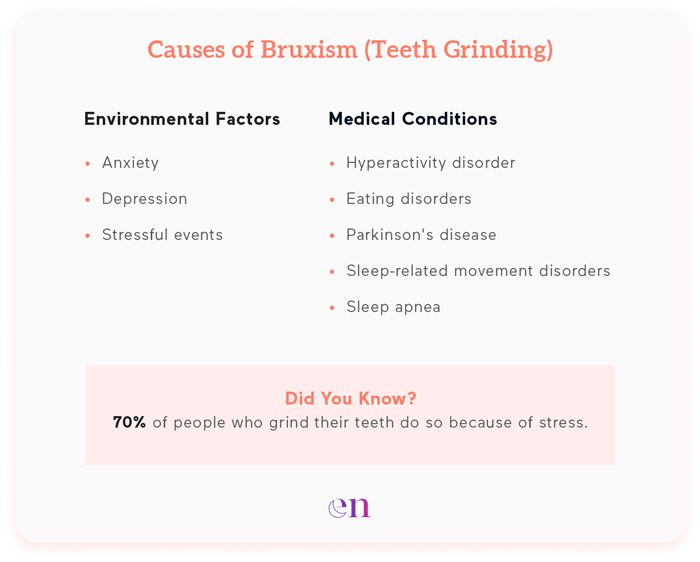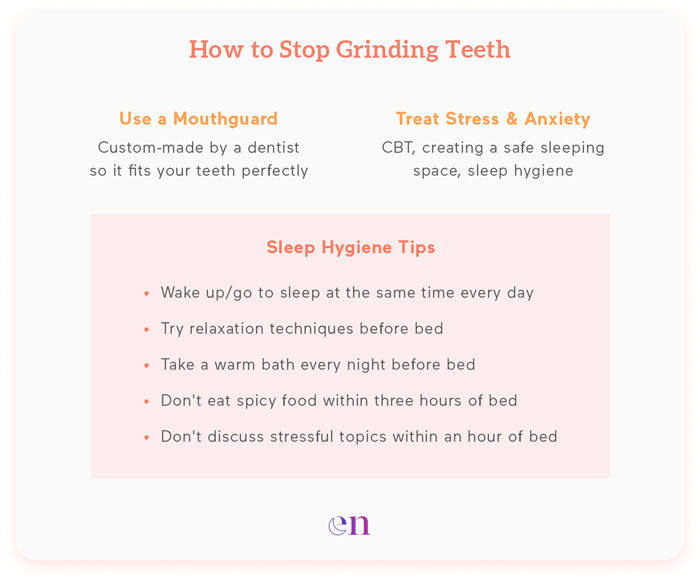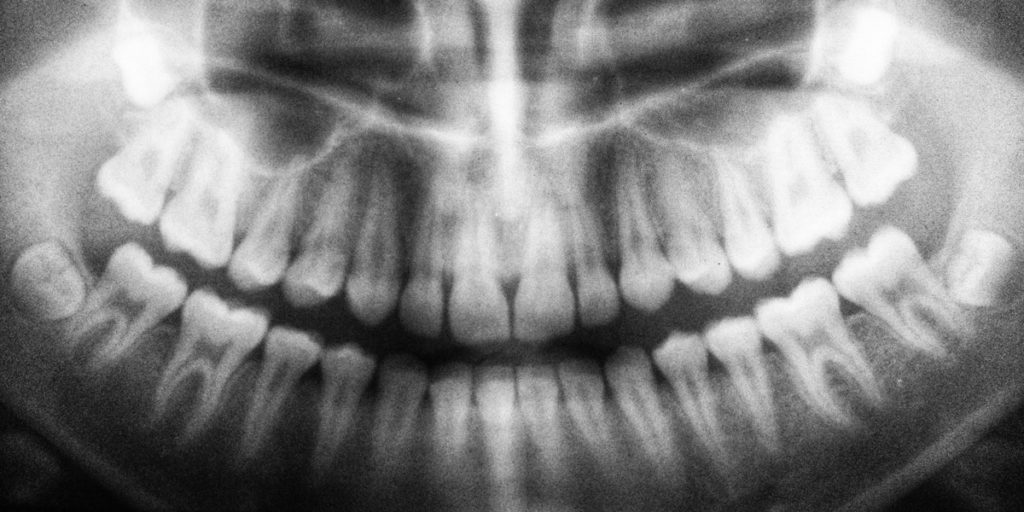If you’ve woken up with a sore jaw or chipped tooth, you might be grinding your teeth. Many people grind their teeth at night without realizing it, and only learn of the habit after somebody else points it out.
Teeth grinding, also called bruxism, is more common in children than adults. Up to a third of kids clench their jaw muscles and grind their teeth. Often stress or anxiety causes tooth grinding in children. Sometimes the alignment of the child’s jaw is also related to tooth grinding in kids. If this is the cause, tooth grinding will most likely resolve when the child gets his or her adult teeth. A child may complain of jaw pain, earaches, or facial pain if they suffer from bruxism.
The most common sign of bruxism in adults is jaw pain. Pain caused by tooth grinding can also move into the ear or sinuses because grinding your teeth causes tension affecting the muscle groups around your jaw. However, sometimes bruxism has no signs at all.
Luckily, treatments for bruxism can resolve both the pain and tooth damage. Let’s look at the signs, causes, and treatments of tooth grinding.
How Do You Know If You Grind Your Teeth?
The symptoms of bruxism can change your appearance. Many times a person only realizes they grind their teeth at night because they look in the mirror and notice something different. Suddenly, the teeth are worn or chipped. The tooth enamel of the lower teeth might begin to wear away, causing sensitivity to heat and cold.
Many people grind their teeth to the point where they damage their tooth enamel but don’t even realize it. It’s not until a checkup when a dental professional notices worn enamel, cracked fillings, or chipped teeth that a person learns they are grinding their teeth at night.
Other times, the symptoms of bruxism are primarily pain-related. Headaches, earaches, facial pain, and pain in the jaw joint are all signs of bruxism.
When you clench your teeth, you clench the muscles surrounding the temporomandibular joint; this joint also connects to the ear canal, which can cause pain there. Some people might mistakenly believe this pain is an ear infection.
Teeth clenching and grinding can cause serious problems like temporomandibular joint dysfunction, or TMJ. Side effects of TMJ include severe jaw pain and difficulty using the jaw muscle to open and close the mouth. Some people say the pain from TMJ is sharp, like pins and needles.
Causes of Bruxism

Environmental factors can lead to bruxism, especially a person’s stress level. In fact, 70% of people who grind their teeth do so because of stress. Common causes of bruxism include:
- Anxiety
- Depression
- Stressful events
In many cases, teeth grinding doesn’t have a specific cause. Teeth grinding can happen episodically during periods of stress or become chronic.
In addition to environmental factors, some medical conditions can cause bruxism, including:
- Hyperactivity disorder
- Eating disorders
- Parkinson’s disease
- Sleep-related movement disorders
- Sleep apnea
Bruxism and Sleep Apnea
While stress is a predominant cause of teeth grinding, another serious sleep condition can also be the culprit. Sometimes teeth grinding may be the first sign a person notices when they have sleep apnea.
Obstructive sleep apnea is a dangerous sleep disorder. A person with sleep apnea is not able to get the oxygen they need to breathe while they are sleeping. Sleep apnea is caused when the muscles in the throat become too relaxed while a person is resting. The muscles collapse and block the airway, making it harder to breathe.
A quarter of people with sleep apnea grind their teeth while they sleep. A person with sleep apnea can treat the tooth grinding by first treating the sleep apnea.
See a sleep medicine professional if you think you might have sleep apnea. Healthcare providers will usually recommend lifestyle changes, such as modifications to diet and exercise, to treat sleep apnea. A doctor may also recommend treating underlying conditions such as asthma and allergies. Using a mouth guard or oral splint might protect the teeth from wear until your symptoms of sleep apnea are under control.
Bruxism and an Abnormal Bite
If you have an abnormal bite, the teeth on your lower jaw don’t match up perfectly with the teeth on your upper jaw. An abnormal bite doesn’t always lead to teeth grinding, but some people might grind their teeth in an attempt to fit their top and bottom jaws together. If you have an abnormal bite and grind your teeth, the American Dental Association recommends dental treatment.
The dentist will treat the abnormally high spots in your teeth by grinding them down to fit better with your other teeth. If grinding your teeth down isn’t effective, your dentist may recommend dental fixtures. Special crowns or inlays can prevent you from tooth grinding.
How to Stop Grinding Teeth

When you notice signs of teeth grinding, have your teeth evaluated at a dental checkup. But even if you don’t notice signs of bruxism and have no pain symptoms, you might still be grinding your teeth. It’s important to get regular dental checkups so your dentist can detect damage as soon as possible. Your dentist can offer medical advice and recommend a treatment program based on your signs and symptoms. There are several different treatment options, depending on the cause.
Use a Mouthguard
Most often, the first line of treatment for bruxism will be a mouthguard, also called a nightguard. It should be custom-made by a dentist so it fits your teeth perfectly. The dentist will take an impression of your teeth and your mouthguard will be created using the impression. The mouthguard will protect your tooth enamel from grinding and clenching. But it won’t stop you from clenching your jaw muscles and grinding your teeth.
Treat Stress and Anxiety
The American Dental Association recommends treating your teeth as well as the underlying cause of bruxism. If your tooth grinding is related to stress, this is the most important factor to address. Identifying your stressors will improve your pain and prevent further tooth enamel damage.
Cognitive behavioral therapy (CBT) is effective at treating anxiety. Many therapists are trained in CBT. A therapist can teach you tools and tricks to reduce your stress before bed and prevent your teeth grinding.
Additionally, you can create a safe sleeping space at home to reduce your anxiety. For most people, this is a room free of screens with soft pillows and blankets and very soft lighting. Instead of looking at a screen before bed, enjoy a cup of tea and read a book while you relax. Make the bedroom a place of comfort you look forward to spending time in each day.
Changing your sleep hygiene and sleep routine can help reduce stress at night. When you feel less stressed before bed, you’ll be less likely to grind your teeth.
Try these sleep hygiene tips for teeth grinding:
- Wake up and go to sleep at the same time every day.
- Try relaxation techniques and deep breathing before bed.
- Take a warm bath (not too hot) every night before bed to let your body know it’s time to sleep.
- While in the bath, place a warm washcloth on each side of your jaw before giving it a little massage.
- Don’t eat spicy food within three hours of bedtime.
- Don’t discuss news, work, or other stressful topics within an hour of going to bed.
Bruxism Can Be Treated
Ultimately, bruxism is a painful condition and many people want a fast fix. When bruxism is caused by stress or mental health conditions, treating the underlying issue can take time. When bruxism is due to dental issues, your dentist will be able to help you treat teeth grinding. If you think your bruxism might be caused by sleep apnea, see your healthcare provider for an evaluation.
Once you determine the cause of your bruxism, you can take action and find a way to stop grinding your teeth.
This article is for informational purposes and should not replace advice from your doctor or other medical professional.

The Conversation (0)
Start a discussion, our content team tries our best to respond to comments. However replies should not be a substitute for medical advice from your doctor.*